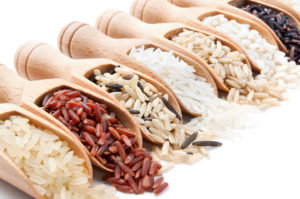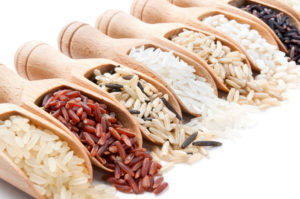In over 9 years of consulting experience, clients often give me puzzled looks when they hear me say RICE can help with weight loss & betterment of health. So yes, this post is all about RICE.

Rice belongs to the grass species Oryza sativa and Oryza glaberrima, also known as Asian and Australian rice respectively. The grain comes in more than 40,000 varieties with different shapes, sizes, texture, aroma, and colors. Different types of rice include white, brown, wild, jasmine, and sushi rice, among others and can be long, medium or short grain rice.
Here is my take on the frequently asked questions about Rice.
Is Rice Nutritious?
Rice is abundant in carbohydrates, which acts as fuel and aids in the normal functioning of the body. It even allows for better assimilation of Vitamin D and calcium which is important for bone health. The manganese component in rice helps to boost the immune system and Thiamine present is important for cognitive process development, that’s how in our Indian household we start our infants with rice kheer or rice water as their weaning foods. Also it has minerals like calcium, iron, magnesium, phosphorus, potassium, manganese, selenium, and copper. Yes, rice is nutritious and integral part of our diets from a new born to an elderly from ancient ages.
Does Rice contain any proteins?
After carbohydrate, protein is the second-most abundant nutrient & of high quality found in rice. It contains amino acids like methionine that is important for muscle development and preserves lean body mass.
Does Rice increase blood sugar levels?
Rather researches suggest that Rice helps in Stabilizing Blood Sugar Levels, this may be odd to hear as white rice is mostly starch and high on the glycemic index. The glycemic index is a term commonly used to rank foods based on how they affect blood sugar. And high blood sugar can lead to weight gain and type II diabetes. Most important explanation for this one is that no one sits down to a meal of white rice only. It’s ALWAYS accompanied by other food like dals, curd, meats, vegetables. This helps to slow down the digestive process thus preventing blood sugar spikes that come from eating high glycemic foods. Rice in proper portion & accompanied with good protein does not increase sugar levels, but people who are highly diabetic need to consult their doctors/ experts before eating rice to know the portion size & frequency of same.
Is Rice gluten free?
Rice is 100% gluten free grain. Gluten free products which is big thing in market these days and are expensive too, instead we can opt for rice and rice products which is so easy & cheaply available in every house hold. Gluten is an essential component found in wheat, barley and rye. It is a complex and difficult protein for the body to digest which results to issues like bloating, indigestion and excess of gluten foods do results to weight gain as they are present in most of junk foods. However, white rice is a very hypoallergenic food and is perfectly acceptable if you’re on a gluten-free diet.
Is Rice fattening?
Rice is low in fat and cholesterol free. It even has inositol, which has fat burning affect. And its anti-anxiety, and irritability reducing properties also helps to control portion sizes and make you feel full for longer time. It improves Metabolism which is important for healthy weight maintenance, as it is an excellent source of vitamins and minerals like niacin, vitamin D, calcium, fibre, iron, thiamine, and riboflavin.
Does Rice cause bloating?
On the contrary, rice helps in gastrointestinal distress and promotes growth of pro-biotic bacteria, eases bowel movement which helps you get rid of bloating. The reason why its also a common pactice in many Indian homes to offer a meal of rice-and-dal or curd-rice or khichdi with some ghee to unwell family-members. Rice is easy to digest and light, it can be broken down easily by the digestive system and provides instant energy.
I am suffering from High BP, can I still have Rice?
Rice is good for High BP patients as it contains negligible amounts of sodium. It is considered a super food as it has low sodium content and high calcium that helps in reducing high blood pressure.
When to eat rice – lunch or dinner? Why?
Either is fine, but I usually suggest rice for dinner as rice contains carbs which has a calming effect & provides satiety which helps in avoiding after-dinner snacking. Tip: Add eliachi or cinnamon stick to your rice, it helps induce good sleep and adds good aroma too.
Is Brown rice better than White rice?
Brown rice is higher in nutrients like vitamin B and fibre than polished white rice. It also helps you feel fuller for a longer time prevents overeating. It is a boon for rice lovers who are on a weight loss programme. Brown rice is also good for diabetics due to its high fibre content. Whereas White Rice does have its own set of benefits like best for acidity, helps in reducing BP, reduces IBS & decreases bloating. Thus, I would suggest you can have them alternatively and enjoy benefits of both depending on your health condition in controlled portion.
In conclusion, Rice is an important part of Indian and Asian tradition, in Hindu culture, we offer a variety of rice preparations as prasadam or nived (offering) to the Gods. Traditionally, its one of the core ingredients of our diet, and one should not be avoiding it. Rather enjoy the benefits it offers by having controlled portions and balancing it with proteins & fibre.
Be happy be healthy, always.

